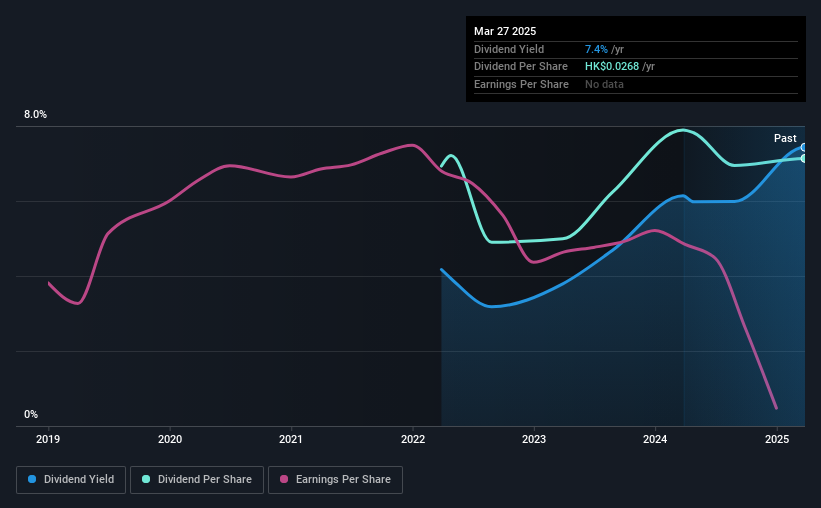
The board of Beijing Enterprises Urban Resources Group Limited (HKG:3718) has announced that it will pay a dividend on the 4th of July, with investors receiving CN¥0.013 per share. This means that the annual payment will be 7.4% of the current stock price, which is in line with the average for the industry.
Estimates Indicate Beijing Enterprises Urban Resources Group's Could Struggle to Maintain Dividend Payments In The Future
While it is always good to see a solid dividend yield, we should also consider whether the payment is feasible. Before this announcement, Beijing Enterprises Urban Resources Group was paying out 346% of what it was earning, and not generating any free cash flows either. Paying out such a large dividend compared to earnings while also not generating free cash flows is a major warning sign for the sustainability of the dividend as these levels are certainly a bit high.
The next 12 months is set to see EPS grow by 44.8%. However, if the dividend continues along recent trends, it could start putting pressure on the balance sheet with the payout ratio getting very high over the next year.

See our latest analysis for Beijing Enterprises Urban Resources Group
Beijing Enterprises Urban Resources Group's Dividend Has Lacked Consistency
Looking back, the company hasn't been paying the most consistent dividend, but with such a short dividend history it could be too early to draw solid conclusions. Since 2022, the dividend has gone from CN¥0.0243 total annually to CN¥0.025. Dividend payments have been growing, but very slowly over the period. The dividend has seen some fluctuations in the past, so even though the dividend was raised this year, we should remember that it has been cut in the past.
The Dividend Has Limited Growth Potential
With a relatively unstable dividend, it's even more important to evaluate if earnings per share is growing, which could point to a growing dividend in the future. Earnings per share has been sinking by 40% over the last five years. A sharp decline in earnings per share is not great from from a dividend perspective. Even conservative payout ratios can come under pressure if earnings fall far enough. On the bright side, earnings are predicted to gain some ground over the next year, but until this turns into a pattern we wouldn't be feeling too comfortable.
We're Not Big Fans Of Beijing Enterprises Urban Resources Group's Dividend
Overall, while some might be pleased that the dividend wasn't cut, we think this may help Beijing Enterprises Urban Resources Group make more consistent payments in the future. The company isn't making enough to be paying as much as it is, and the other factors don't look particularly promising either. Overall, this doesn't get us very excited from an income standpoint.
Investors generally tend to favour companies with a consistent, stable dividend policy as opposed to those operating an irregular one. At the same time, there are other factors our readers should be conscious of before pouring capital into a stock. Just as an example, we've come across 4 warning signs for Beijing Enterprises Urban Resources Group you should be aware of, and 2 of them make us uncomfortable. Looking for more high-yielding dividend ideas? Try our collection of strong dividend payers.
Have feedback on this article? Concerned about the content? Get in touch with us directly. Alternatively, email editorial-team (at) simplywallst.com.
This article by Simply Wall St is general in nature. We provide commentary based on historical data and analyst forecasts only using an unbiased methodology and our articles are not intended to be financial advice. It does not constitute a recommendation to buy or sell any stock, and does not take account of your objectives, or your financial situation. We aim to bring you long-term focused analysis driven by fundamental data. Note that our analysis may not factor in the latest price-sensitive company announcements or qualitative material. Simply Wall St has no position in any stocks mentioned.